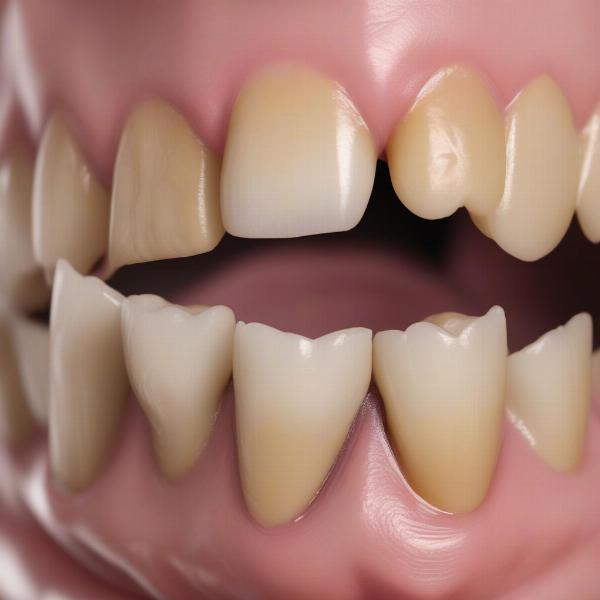Plaque away for dogs is a crucial aspect of their overall well-being. Just like humans, dogs can suffer from dental diseases like plaque buildup, gingivitis, and periodontal disease if their oral hygiene is neglected. Understanding how to manage plaque in dogs is essential for responsible pet ownership and can contribute significantly to a longer, healthier life for your furry friend. This article will delve into the causes, prevention, and treatment of plaque in dogs, providing you with the knowledge to keep your canine companion’s teeth sparkling clean and their breath fresh.
Understanding Canine Plaque
What exactly is plaque? It’s a sticky, colorless film that constantly forms on your dog’s teeth. This film is composed of bacteria, food particles, and saliva. If left unaddressed, plaque hardens into tartar, a yellowish-brown deposit that can lead to more serious dental problems. Tartar buildup irritates the gums, causing inflammation (gingivitis) and, if left untreated, can progress to periodontal disease, which can damage the supporting structures of the teeth and even lead to tooth loss. Beyond the mouth, periodontal disease can also affect other organs, such as the heart, kidneys, and liver.
 Dog Plaque Buildup on Teeth
Dog Plaque Buildup on Teeth
Preventing Plaque in Dogs
The good news is that plaque buildup is largely preventable. Regular brushing is the cornerstone of canine dental hygiene. Ideally, you should brush your dog’s teeth daily using a toothbrush and toothpaste specifically designed for dogs. Never use human toothpaste, as it often contains xylitol, which is toxic to dogs.
What if your dog resists brushing? Start slowly and positively reinforce the experience with treats and praise. Introduce dental chews and toys designed to mechanically scrape away plaque. These can be a valuable addition to your dog’s dental care routine.
Treating Existing Plaque
If your dog already has plaque buildup, a professional dental cleaning by a veterinarian is necessary. This procedure involves scaling and polishing the teeth under general anesthesia to remove plaque and tartar. The veterinarian can also address any existing dental problems, such as gingivitis or periodontal disease.
Dr. Emily Carter, DVM, a veterinary dentist based in London, emphasizes the importance of professional cleanings: “While home care is crucial, professional cleanings are essential for removing hardened tartar and addressing any underlying gum disease. It’s the most effective way to ensure your dog’s long-term oral health.”
Diet and Plaque Formation
What your dog eats plays a role in plaque formation. Dry kibble can be beneficial as it helps to scrape away plaque as the dog chews. Avoid sugary treats and sticky foods that can adhere to the teeth and contribute to plaque buildup.
Signs of Dental Problems in Dogs
How do you know if your dog has dental problems? Look out for bad breath, red or swollen gums, excessive drooling, difficulty chewing, or pawing at the mouth. If you notice any of these signs, consult your veterinarian. Early intervention is key to preventing more serious issues.
Conclusion
Plaque away for dogs is more than just a cosmetic concern; it’s a vital part of their overall health. By implementing a regular dental care routine, including brushing, dental chews, and professional cleanings, you can help your dog maintain healthy teeth and gums for years to come. Remember to consult your veterinarian if you have any concerns about your dog’s dental health. Their expertise is invaluable in ensuring your furry friend receives the best possible care.
FAQ
- How often should I brush my dog’s teeth? Ideally, daily.
- Can I use human toothpaste on my dog? No, human toothpaste often contains xylitol, which is toxic to dogs.
- What are the signs of dental problems in dogs? Bad breath, red or swollen gums, excessive drooling, difficulty chewing, pawing at the mouth.
- What should I do if my dog already has plaque buildup? Schedule a professional dental cleaning with your veterinarian.
- Are dental chews effective in removing plaque? They can be a helpful supplement to brushing, but they don’t replace the need for regular brushing and professional cleanings.
- What kind of diet is best for my dog’s dental health? Dry kibble can help scrape away plaque. Avoid sugary treats and sticky foods.
- Can periodontal disease affect other organs in my dog’s body? Yes, it can affect the heart, kidneys, and liver.
ILM Dog is your trusted international resource for all things dog-related. We offer expert advice on everything from choosing the right breed to ensuring the health and well-being of your beloved companion. With our focus on Dog Health and Care, including dental hygiene, we provide practical, reliable information for dog owners worldwide. Whether you’re a seasoned owner or just starting your journey, we have the resources to help you provide the best possible care for your furry friend. Contact us at [email protected] or +44 20-3965-8624. Visit ILM Dog for more valuable information and expert guidance.